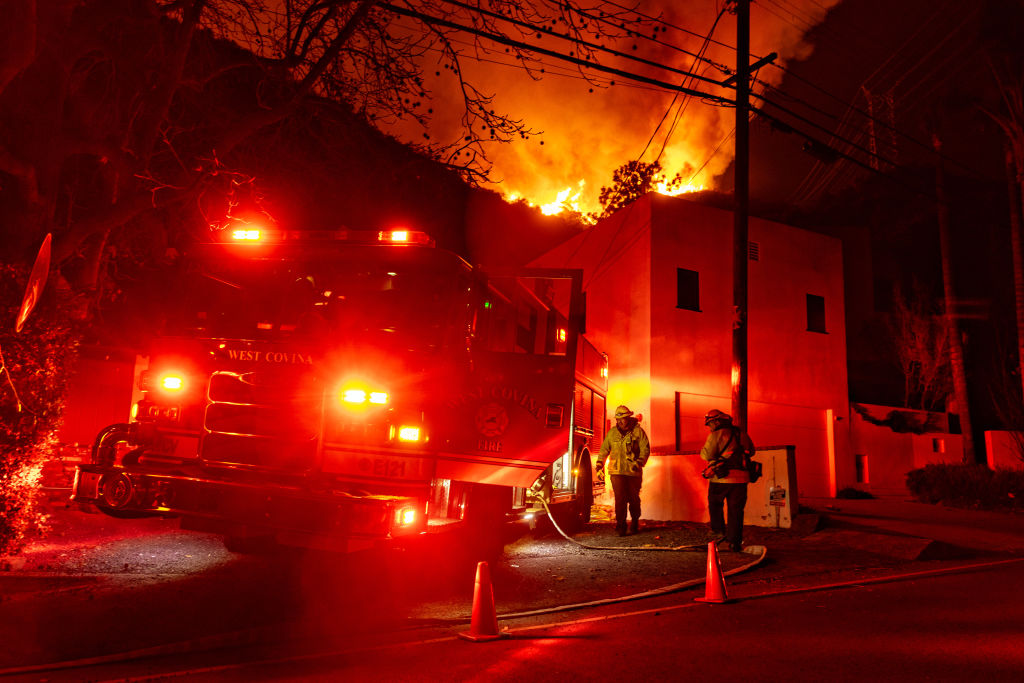How America’s political war has pushed ‘the Endarkenment’
Expert sees decline moving into "unreason, bordering, at times, on a psychotic breakdown'



Late on election night in an understandably upbeat and surprisingly conciliatory victory speech at the Palm Beach Convention Center, President-elect Donald Trump declared, “We’re going to help our country heal.” He expressed gratitude to his base: “But most of all I want to thank the millions of hard-working Americans across the nation who have always been the heart and soul of this really great movement.” He promised that “[w]e’re going to turn it around” because America is home to “the greatest people.” He boasted of his movement’s inclusiveness: “We’ve built the biggest, the broadest, the most unified coalition, they’ve never seen anything like it, in all of American history.” That coalition, he asserted proudly, encompasses “young and old, men and women, rural and urban” as well as “union, non-union, African American, Hispanic American, Asian American, Arab American, Muslim American, we had everybody, and it was beautiful.” And it represented an “historical realignment uniting citizens of all backgrounds around a common core of common sense.”
The reality remains, however, that America is bitterly divided, with nearly half the nation having greatly preferred Vice President Kamala Harris. And the country’s pressing concerns would test even a unified nation.
Among other important tasks, the incoming administration must restore order to the southern border and fix our broken immigration system. It must bring under control the nation’s approximately $35.5-trillion-and-growing national debt, which is 123% of the nation’s FY2024 GDP. It must shift K-12 schools and colleges and universities away from indoctrination and reorient them toward education – starting with teaching the basics and all the while cultivating students’ ability to weigh evidence, imagine other people’s perceptions and passions, tolerate and learn from competing opinions, and think independently. It must reduce the strain on families and communities from globalization, workplace automation, and the digital-technology revolution. It must develop America’s energy resources while caring for the environment. It must rein in politicized bureaucracies, especially law enforcement and intelligence. And it must assist Ukraine in thwarting Russian aggression, back Israel in defending itself against Iran and its proxies, and steel the country for a long struggle with the People’s Republic of China, a struggle sparked by the Chinese Communist Party’s endeavors in every region of the world to entrench its authoritarian norms and practices.
Lasting policy reforms will require a measure of compromise and conciliation. It asks a lot of the winning side – whom progressive elites relentlessly vilified as a threat to democracy – to reverse course. Nevertheless, the Trump team has an interest in promoting public comity by offering those the president-elect has portrayed as “enemies from within” opportunities to prove themselves partners in stabilizing the nation. It also asks a lot of the losing side – whom conservatives have relentlessly vilified as a threat to democracy – to cooperate to advance the common good. Despite the disposition to anticipate the worst from the incoming administration, progressives have an interest in obtaining a seat at the table.
Yet prospects for compromise and conciliation seem remote. Since both sides have long suspected the other of plotting democracy’s overthrow, it is more likely that both will dig in and prepare for higher-intensity hostilities. Campaign 2024 has only reinforced conservatives’ conviction that the mainstream media and governmental institutions tend to serve as progressive bastions aimed at snuffing out dissent from Democratic Party orthodoxy. And Trump’s decisive victory is likely to reinforce progressives’ propensity to scorn as authoritarian insurgents those who refuse to accept the narratives and judgments favored by mainstream-media outlets and governmental institutions.
The situation, argues Martin Gurri in City Journal’s autumn issue, is more dire still. In “The Endarkenment,” he argues that the sources of Americans’ mutual enmity and widespread distrust run deeper than vehement dissatisfaction with contemporary politics. The disarray and distemper that roil the nation, he contends, stem from nothing less than an exhaustion of the Enlightenment – the great modern embrace of natural science, individual freedom and human equality, and reasoned inquiry as a guide to happiness and justice. Gurri’s grim diagnosis is particularly alarming for the United States, whose founding principles and constitutional traditions have strong Enlightenment roots.
A former CIA analyst and author of “The Revolt of the Public and the Crisis of Authority in the New Millenium,” Gurri sees “symptoms of a mass decline in America into unreason – bordering, at times, on a psychotic breakdown.” In 2020, for example, San Francisco adopted draconian measures to combat COVID-19, which killed 257 residents that year, while turning a blind eye to, if not encouraging use of, dangerous drugs, which in 2020 killed 697 San Franciscans. In 2022, at her Senate confirmation hearing for appointment to the United States Supreme Court, Justice Ketanji Brown Jackson – a Harvard College and Harvard Law School graduate – said that she could not define the word “woman.” In 2024, a New York court convicted Trump of 34 felony counts of a crime that was invented especially for him and which few Americans could name, let alone explain.
“Strange fantasies,” writes Gurri, “have overwhelmed reality: it’s an age of delusion, impossible longings, and ritual self-mutilation.” He names this decay of common sense and dissipation of shared reality “the ‘Endarkenment’ because it rises, like an accusing specter, out of the corpse of the fallen Enlightenment.” It is marked by “the pathological disorientation that convulses a society after it has extinguished all sources of meaning and lost sight of all paths to a happier future.”
The collapse of confidence in reason widens the gap, and poisons relations, between the elites and the people. The poisoning proceeds from the top, spawning “the infantilization of top echelons of the social pyramid – of hyper-credentialed, globally mobile people, wielders of power and wealth and media, who, on a routine basis, confuse their self-important imaginings with the world itself.” Smug elites precipitate “the widespread descent of everyone else, now deprived of teachers, preachers, and role models, into a cognitive underclass, prone to the most bizarre theories about how things work.”
Gurri maintains that “[t]he chaos has infected every level of contemporary society.” He finds powerful evidence of reason’s unraveling in Trump and his inexhaustible hyperbole and even more in President Joe Biden, “the most powerful man on earth, decider between peace and war,” who “is unable to complete a coherent sentence.” Worse is the condition of the young generation. The Zoomers “suffer from unprecedented levels of anxiety, depression, and suicide.” Imprisoned in a digital “house of mirrors,” they are surrounded by virtual friends and a kaleidoscope of flickering images and fleeting impressions. They experience too few face-to-face relations and lack stabilizing beliefs and examples – living and literary – of fidelity, sacrifice, and honor. Meanwhile, the surrounding culture wages war on basic elements of common sense, proclaiming that children must choose their sex, gender is fluid, and that biological males who declare themselves females must be allowed to dress in women’s locker rooms and compete in women’s sports.
Drawing explicitly on Frankfurt School theorizing and obliquely on Nietzsche, Gurri blames America’s descent into moral bewilderment on Enlightenment liberalism which, he contends, has undermined its own claims to universality. This extreme indictment, however, confuses reason and reason’s debasement: It is reasonable to respect reason’s limits in illuminating the complexities of morality and politics.
Nevertheless, Gurri maintains that the Enlightenment disposition to subject all things to rational analysis begins by demystifying the physical world, but eventually erodes the authority of family, faith, and community and in the end demystifies human nature and human affairs. “Social relations were stripped of all transcendental trappings,” he writes. “The purpose of human life was understood to be the reproduction of selfish genes.” Ultimately, reason turns on reason itself. Thus commences the era of Endarkenment, “an age without faith or reason.”
The way back out of the darkness toward the light will be long, winding, steep, and harrowing. “A balance must be struck that lifts us out of pure randomness and materialism to a credible – and shared – higher purpose,” maintains Gurri. “The famine of meaning can be fatal. The rise of totalitarianism and, to a lesser extent, the ‘established church’ of identity and climate doom today are examples of the political deformations that occur when the balance breaks: the hunger will be satisfied in some way.”
Gurri does not go so far as to pin his hopes on a religious awakening. In his “optimistic moods,” though, he envisages “prophets and philosophers who conceive a dramatically updated spiritual vision, with the rational and the sacred, truth and meaning, reconciled in the righteous life.”
Hope, though, is not a strategy for diminishing the endarkenment, and true prophets and wise philosophers are rare.
While politics is no place to find salvation, the Trump administration can make its contribution by easing the mutual enmity and diminishing the widespread distrust that divide citizens and cloud the public interest. This should be a priority not least because the effective implementation and lasting impact of many of the president-elect’s worthy aims depend on it.
SUPPORT TRUTHFUL JOURNALISM. MAKE A DONATION TO THE NONPROFIT WND NEWS CENTER. THANK YOU!
What's Your Reaction?

































































































